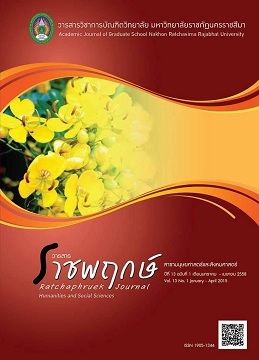The Model of Learning Organization of the Secondary School under the Office of the Private Education Commission in Bangkok Metropolitan
Main Article Content
Abstract
This research was aimed at studying 1) the situation of learning organization, 2) the factors that impacted the learning organization, and 3) the development of learning organization’s model. The mixed method was adopted, both the qualitative and the quantitative, and were used to fulfill each others. For the quantitative research method, the 124 administrators of private schools in Bangkok were selected as the sample through questionnaire. For the qualitative research, its key informants were 1) the administrators in educational policy formulation under the Office of the Private Education Commission, 2) the administrators in Bangkok Educational Service Area Office, and 3) the administrators of private schools in Bangkok Metropolitan. The statistical data analyses were multiple regression, frequency, percentage, mean, and standard deviation.
The research findings were as follows:
1. The present situation of learning organization of the secondary school under the Office of the Private Education Commission in Bangkok Metropolitan consisted of; focusing on excellence, mental thinking, system thinking, shared vision, and team learning. The mean of total performance of learning organization was high.
2. The factors influencing on learning organization of the Secondary School under the Office of the Private Education Commission in Bangkok Metropolitan consisted of ; 1) factors of personalization; sex, age, educational level, experience of administration, and position, 2) factors of organization; organizational structure, 3) factors of learning; learning level, learning pattern, and learning skills, 4) factors of knowledge management; knowledge, defining creation and searching knowledge, systematic store of knowledge, knowledge processing and screening, sharing knowledge, and accessing knowledge application for learning.
3. The model of learning organization of the secondary school under the Office of the Private Education Commission in Bangkok Metropolitan consisted of; 1) the introduction of model; background model, objective model, concepts and principles to create the model, and the conditions for succession, and 2) the key elements of learning organization consisted of three elements; core factors which was supported to be learning organization, the management to be learning organization, and the guideline for implementing the model. vision, organizational culture, strategy, leadership of school administrator, and using of technology for learning,
Article Details
References
พรธิดา วิเชียรปัญญา. (2547). การจัดการความรู้พื้นฐานและการประยุกต์ใช้. กรุงเทพฯ : เอ็กซเปอร์เน็ท.
พรพิมล หรรษาภิรมย์โชค. (2550). การพัฒนารูปแบบการจัดการความรู้สำหรับหน่วยงานภาครัฐ. วิทยานิพนธ์ครุศาสตรดุษฎีบัณฑิต สาขาวิชาเทคโนโลยีและสื่อสารการศึกษา บัณฑิตวิทยาลัย จุฬาลงกรณ์มหาวิทยาลัย.
สุรัตน์ ดวงชาทม. (2549). การพัฒนาสู่ความเป็นองค์กรแห่งการเรียนรู้ : กรณีสำนักงานเขตพื้นที่การศึกษามหาสารคาม เขต 2. วิทยานิพนธ์ศึกษาศาสตรดุษฎีบัณฑิต สาขาวิชาการบริหารการศึกษา บัณฑิตวิทยาลัย มหาวิทยาลัยขอนแก่น.
วรวรรณ วาณิชย์เจริญชัย. (2548). การพัฒนาระบบการสร้างความรู้ด้วยวิธีการเรียนรู้เป็นทีมสำหรับอาจารย์ในสถาบันอุดมศึกษา. วิทยานิพนธ์ครุศาสตรดุษฎีบัณฑิตสาขาวิชาเทคโนโลยีและสื่อสารการศึกษา บัณฑิตวิทยาลัย จุฬาลงกรณ์มหาวิทยาลัย.
Gephart, M., V. Marsick and M. Buren. (1997). “Finding Common and Uncommon Ground among Learning Organization Model.” In proceeding of the Fourth Annual Conference of the Academy of Human Resource Development. pp. 38. LA : Academy.
Marquardt, M. and A. Reynolds. (1994). The Global Learning Organization. BurrRidge, IL : lrwin professional.
Marquardt, M. J. (1996). Building the Learning Organization. New York : McGraw-Hill.
Senge, P. M. (1990). The Fifth Discipline : The Art and Practice of the Learning Organization. New York : Doubleday.
Reece, P. D. (2004). Universities as Learning Organizations: How can Australian Universities Become Learning Organization?. Doctoral dissertation, Murdoch University.


